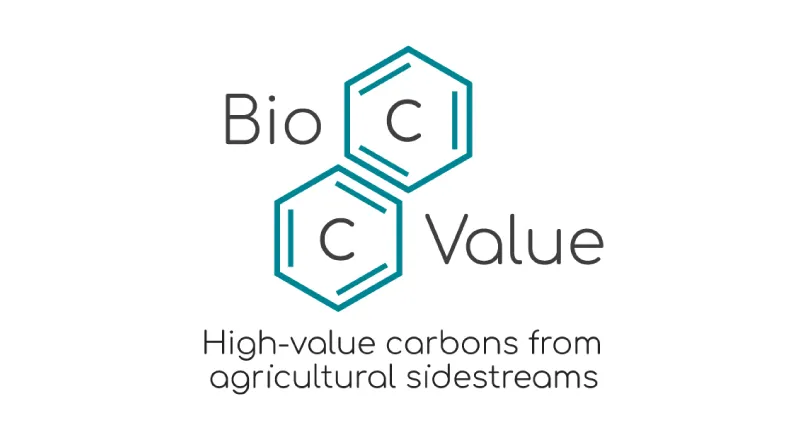BioCarbonValue - High-value carbons from agricultural biomass

Alternative carbon materials to replace fossil-based carbon in high-value applications such as energy storage systems, biocomposites, and purification processes was developed in a joint research project of LAB University of Applied Sciences and VTT (coordinator). Biocarbon (or biochar) production is a newly emerging industry that benefits climate and the environment while offering multi-billion-euro business opportunities.
High-value carbons such as graphite, carbon black and activated carbon are crucial for various products and processes across multiple industries. However, these carbons have long supply chains and are mainly produced from fossil-based feedstocks such as coal and oil. In addition, the EU and the US have classified certain carbon products such as graphite, as a strategic and critical mineral.
The BioCarbon Value project was funded by the Business Finland Co-Innovation partnership funding and it was part of the ExpandFibre Ecosystem led by Fortum and Metsä Group. Co-founders of the project included Fortum, Sumitomo SHI FW, Neova, Premix, PUHI, Carbofex, Carbo Culture, Fifth Innovation, and the City of Heinola. The total budget for the project was 1.2M€, and the project was implemented in 2023–2024.
OBJECTIVES
The project aimed at supporting the development business ecosystem around agricultural side streams. This was implemented by evaluation of the entire value chain of biocarbon production. Main points of the value chain consideration were:
- Considering sustainability aspects of the value chain, including sourcing, cultivation and harvesting
- Utilizing agro-based materials for high-value biocarbons
- Modeling, mass balance calculation, simulations, and techno-economic assessment (TEA)
- Application tests for end-use: energy storage, biocomposites and water purification
- Biocarbon market foresight
OUTCOMES
Agriculture produces a significant amount of side streams that are currently underutilized. Moreover, the volumes are estimated to increase rapidly as field biomass will be increasingly utilized resource in the future. Field and short rotation biomasses as well as agro waste e.g. from food industry provide significant (existing) volume based business opportunity, but there are challenges e.g. in the profitability, sustainability and the resilience of the value chain. Therefore, a systemic way of thinking (value hierarchy, industrial symbioses, profitability through ecosystemic thinking) is needed.
The global demand for high value carbon products such as battery carbons, activated carbon and other carbon-based materials is significantly increasing and is further driven by sustainability demands and Green transition goals. High value carbons have already well-established multibillion market, but the main material for the industry currently being principally fossil-based. It has been determined, that biocomposites have one of the highest potential in replacing oil-based plastics. This creates high demand for biobased composites – 30% annual growth only in Europe.
REALISATION OF GOALS
The BioCarbonValue project showed that side streams from agriculture and the food industry are suitable as raw materials for biocarbon, but the quality of the raw material has a significant impact on the biocarbon properties. Application tests showed that biocarbons made from side streams are also suitable for use as a high-value carbon product in energy storage, water purification and biocomposites. The project also produced new information on the profitability of a biochar plant utilizing field biomass and the market prospects for biochar.
High-value carbons such as graphite, carbon black and activated carbon are crucial for various products and processes across multiple industries. However, these carbons have long supply chains and are mainly produced from fossil-based feedstocks such as coal and oil. In addition, the EU and the US have classified certain carbon products such as graphite, as a strategic and critical mineral.
The BioCarbon Value project was funded by the Business Finland Co-Innovation partnership funding and it was part of the ExpandFibre Ecosystem led by Fortum and Metsä Group. Co-founders of the project included Fortum, Sumitomo SHI FW, Neova, Premix, PUHI, Carbofex, Carbo Culture, Fifth Innovation, and the City of Heinola. The total budget for the project was 1.2M€, and the project was implemented in 2023–2024.
OBJECTIVES
The project aimed at supporting the development business ecosystem around agricultural side streams. This was implemented by evaluation of the entire value chain of biocarbon production. Main points of the value chain consideration were:
- Considering sustainability aspects of the value chain, including sourcing, cultivation and harvesting
- Utilizing agro-based materials for high-value biocarbons
- Modeling, mass balance calculation, simulations, and techno-economic assessment (TEA)
- Application tests for end-use: energy storage, biocomposites and water purification
- Biocarbon market foresight
OUTCOMES
Agriculture produces a significant amount of side streams that are currently underutilized. Moreover, the volumes are estimated to increase rapidly as field biomass will be increasingly utilized resource in the future. Field and short rotation biomasses as well as agro waste e.g. from food industry provide significant (existing) volume based business opportunity, but there are challenges e.g. in the profitability, sustainability and the resilience of the value chain. Therefore, a systemic way of thinking (value hierarchy, industrial symbioses, profitability through ecosystemic thinking) is needed.
The global demand for high value carbon products such as battery carbons, activated carbon and other carbon-based materials is significantly increasing and is further driven by sustainability demands and Green transition goals. High value carbons have already well-established multibillion market, but the main material for the industry currently being principally fossil-based. It has been determined, that biocomposites have one of the highest potential in replacing oil-based plastics. This creates high demand for biobased composites – 30% annual growth only in Europe.
REALISATION OF GOALS
The BioCarbonValue project showed that side streams from agriculture and the food industry are suitable as raw materials for biocarbon, but the quality of the raw material has a significant impact on the biocarbon properties. Application tests showed that biocarbons made from side streams are also suitable for use as a high-value carbon product in energy storage, water purification and biocomposites. The project also produced new information on the profitability of a biochar plant utilizing field biomass and the market prospects for biochar.
Project period
-
Project state
Finished
Project area
National
Project funding
BF Kumppanuusrahoitus

LAB role
Partner
Unit
Technology
Project focus area
Multipurpose materials


